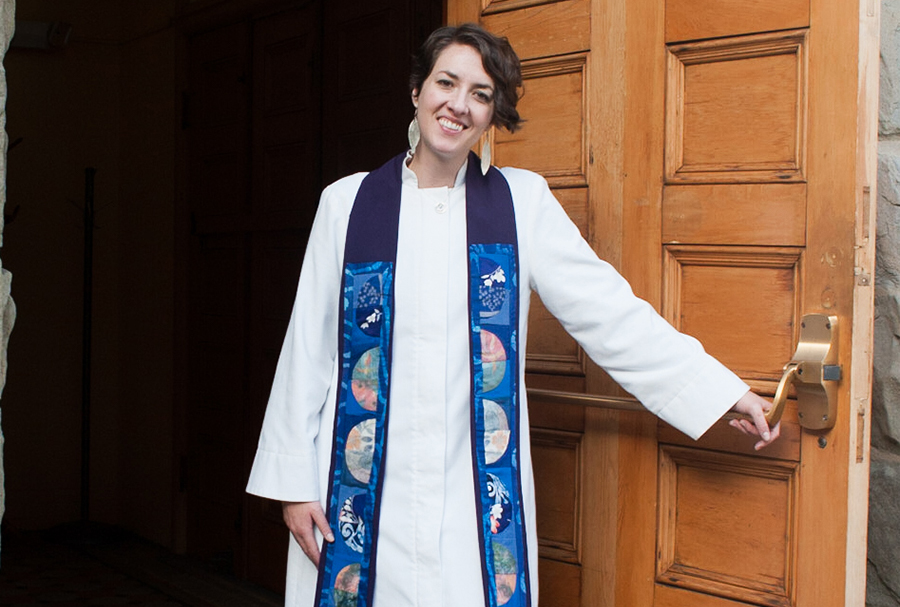“This city has wonderful justice work going on — but there’s a lot more work that needs to be done,” said the Rev. Abbey Tennis.
That’s a goal of Tennis’ as she assumes the role of minister at First Unitarian Church of Philadelphia.
Tennis, 35, is the first settled female minister at the 220-year-old congregation. She is also queer — though she’s not the congregation’s first out minister.
“The previous minister was the first openly gay minster to lead the congregation and the interim minister in between us was queer,” she explained. “So we’re going on nine years of GLBT leadership, and even longer-standing ties to the community.”
Despite being the first woman to lead the congregation as minister, Tennis noted that diverse leadership is prevalent throughout the congregation.
“The chair of our board is a young woman; she’s 29. The head of our ministry leadership is a young gender-nonconforming person. Most of our staff is young queer women,” she said. “I’ve been a young woman in leadership before but it’s rare for a historic institution like this one to be run almost entirely by young women.”
The Unitarian Universalist congregation operates out of 2125 Chestnut St.; the building itself is 120 years old and was built by the son of the congregation’s first settled minister, the Rev. Dr. William Henry Furness, an abolitionist.
“This church has a 200-plus-year history as a place of open-mindedness,” Tennis said. “A lot of churches moved out to the suburbs in the time of white flight, but we remain downtown and I think we have an opportunity to rebuild what could be a powerful force in people’s lives and the world. It already is a powerful force, but I think it can be even more powerful in the city of Philadelphia.”
Promoting racial justice has been, and will continue to be, integral to the congregation’s focus, Tennis said.
Earlier this year, the church unfurled a banner proclaiming support for the Black Lives Matter movement.
“We’re now in the process of deepening our understanding of how we can support the movement and deepening our work in racial justice in general in the city,” Tennis said, noting that goal extends to the congregation’s ongoing work regarding reforms in the educational and criminal-justice systems. “Racial justice is a big priority, and so is working for justice in the LGBTQ community.”
Tennis was raised in the UU community, a religious upbringing that she said made her coming out as bisexual at 14 an empowering experience.
“When I came out, I was not only completely loved and welcomed, I was invited into leadership in the congregation,” she said. “This was the mid-’90s and we were going through a process of deconstructing institutional homophobia and working on how we could be a welcoming congregation to LGBTQ people. Even as a 14- or 15-year-old, my congregation honored who I was and welcomed me into having a voice as to how we could be a better people together. That was really powerful.”
Tennis went on to serve as a lay representative in local and national UU circles. She was the first youth to sit on the UU Association’s national board and also served on the Ministerial Fellowship Committee, the denomination’s credentialing body.
Tennis grew up in the Boston area and earned a master’s of business administration from the University of Massachusetts. She worked in the climate-change arena before pursuing her master’s of divinity from the Starr King School for the Ministry in California.
“My MBA was in nonprofit management because I always felt in some way like it was important to devote my life to creating justice in the world,” she said, noting that her father’s battle with brain cancer followed by her divorce prompted her to reassess her career path. “I felt like the political side of justice work just wasn’t enough. I had been thinking of ministry on and off since I was in junior high and that call came back. And I followed it this time.”
Tennis was ordained last year and served as an intern minister in Washington, D.C., before being unanimously called by the First Unitarian congregation after its year-long search.
She began the post in August and was officially installed last month. Tennis now lives in West Philadelphia.
“Philadelphia is exactly the place that felt right for me,” Tennis said. “I was moved by the possibility of building multi-racial, multi-cultural, multi-generational community in an urban setting. We need spaces for people of all theological orientations to love each other and deepen their spirits together.”
For more information, visit www.philauu.org. First Unitarian holds worship services at 11 a.m. Sundays at 2125 Chestnut St.
